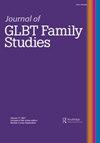Attachment Identity as a Predictor of Relationship Functioning Among Heterosexual and Sexual-minority Women
IF 2
Q2 FAMILY STUDIES
引用次数: 3
Abstract
Abstract Limited research examines the impact of attachment on variables reflecting relationship functioning (i.e., relationship satisfaction, sexual satisfaction, and relationship commitment), especially among sexual-minority women (SMW). Given that such research utilizes a heterocentric lens, it is difficult to discern whether prior findings would also extend to SMW. Additional research is, therefore, warranted to identify if the theoretical foundation of attachment is relevant in understanding the relationship functioning of SMW. This study, therefore, sought to examine attachment dimensions (i.e., anxiety and avoidance) as predictors of relationship functioning variables and to assess for what, if any, differences exist between two groups: (a) heterosexual women and (b) SMW. An online survey was distributed to 166 women currently within relationships. There were no significant differences in relationship functioning variables nor in attachment dimensions between groups. Attachment anxiety explained over 31% of the variance in relationship satisfaction, over 39% of the variance in sexual satisfaction, and over 33% of the variance in relationship commitment between both groups. Conversely, attachment avoidance explained almost 18% of the variance in sexual satisfaction, but not did predict relationship satisfaction nor relationship commitment. These findings are further discussed in the context of limitations and clinical implications for practice.依恋认同对异性恋和性少数群体女性关系功能的预测
有限的研究考察了依恋对反映关系功能的变量(即关系满意度、性满意度和关系承诺)的影响,特别是在性少数女性(SMW)中。鉴于此类研究采用了异心透镜,很难辨别先前的研究结果是否也适用于SMW。因此,有必要进行进一步的研究,以确定依恋的理论基础是否与理解SMW的关系功能有关。因此,本研究试图检验依恋维度(即焦虑和回避)作为关系功能变量的预测因子,并评估(a)异性恋女性和(b)男同性恋者两组之间存在的差异(如果有的话)。一份在线调查向166名处于恋爱关系中的女性分发。两组之间的关系功能变量和依恋维度均无显著差异。依恋焦虑解释了两组之间超过31%的关系满意度差异,超过39%的性满意度差异,以及超过33%的关系承诺差异。相反,依恋回避解释了近18%的性满意度差异,但不能预测关系满意度和关系承诺。这些发现在局限性和临床实践意义的背景下进一步讨论。
本文章由计算机程序翻译,如有差异,请以英文原文为准。
求助全文
约1分钟内获得全文
求助全文
来源期刊

JOURNAL OF GLBT FAMILY STUDIES
FAMILY STUDIES-
CiteScore
3.90
自引率
0.00%
发文量
0
期刊介绍:
The Journal of GLBT Family Studies is a much-needed resource on the working dynamics of the diverse family structures found in every corner of the world. This groundbreaking new journal addresses the vital issues facing gay, lesbian, bisexual, and transgender individuals and their families. Edited by Dr. Jerry J. Bigner, who has provided expert witness testimony in legal cases and in the litigation involving same-sex marriages in Canada, the journal features interdisciplinary studies and scholarly essays on topics related to GLBT family life and functioning as well as relationships with other families.
 求助内容:
求助内容: 应助结果提醒方式:
应助结果提醒方式:


